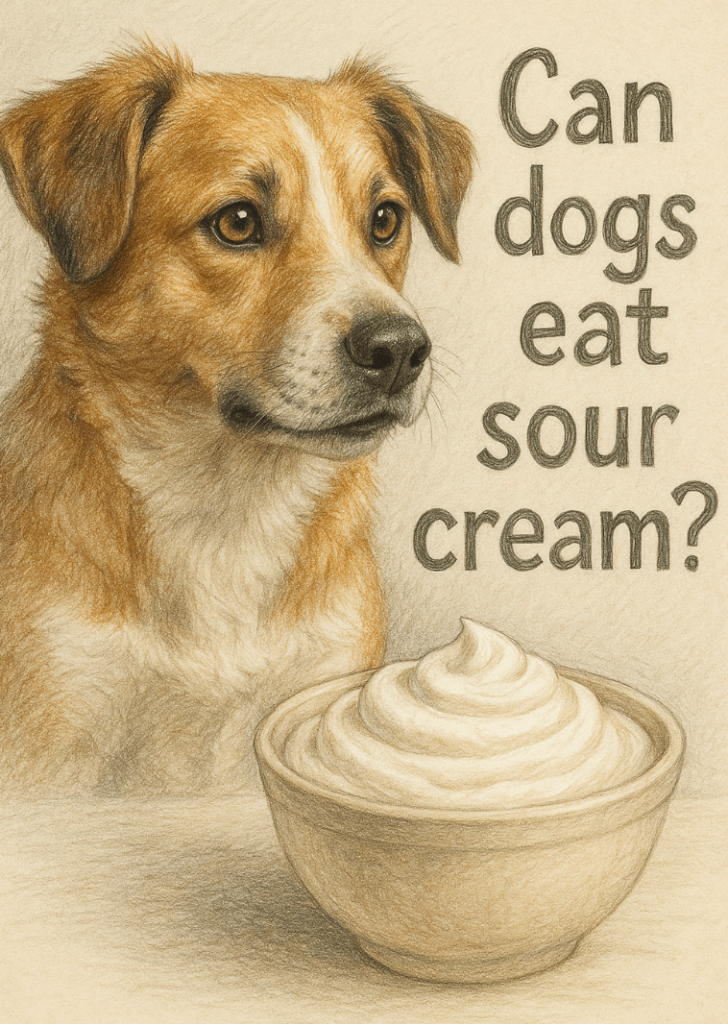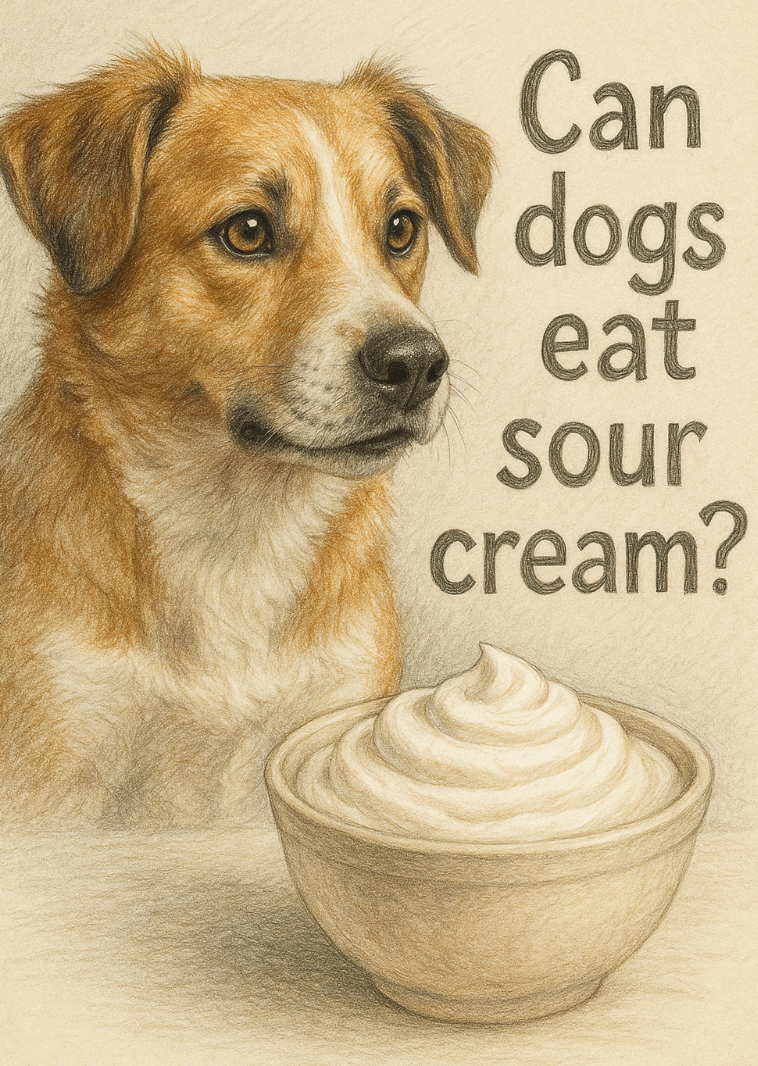Can Dogs Eat Sour Cream? What You Need to Know
Sour cream is a popular dairy product enjoyed by many people, but can dogs eat sour cream safely? As a responsible pet owner, it’s natural to wonder whether this creamy treat is suitable for your furry friend. While small amounts of sour cream may not pose an immediate danger, there are important considerations to keep in mind before sharing it with your dog. In this blog post, we’ll explore the potential risks and benefits, alternatives to sour cream, and expert tips for feeding your dog safely. By the end, you’ll have all the information you need to make informed decisions about your dog’s diet.
Potential Risks of Feeding Sour Cream to Dogs
While sour cream isn’t toxic to dogs, it does come with certain risks that every pet owner should be aware of. Understanding these hazards will help you decide whether it’s worth including in your dog’s diet.
High Fat Content:
Sour cream is rich in fat, which can lead to digestive upset, pancreatitis, or obesity if consumed in excess.Lactose Intolerance:
Many dogs are lactose intolerant and may experience gas, diarrhea, or bloating after consuming dairy products like sour cream.Empty Calories:
Sour cream offers little nutritional value and can contribute to weight gain without providing essential nutrients.Additives and Preservatives:
Store-bought sour cream often contains artificial ingredients that may irritate your dog’s stomach or cause allergic reactions.Risk of Overfeeding:
Even small portions can add up quickly, especially for smaller breeds, leading to unintended health issues over time.
These risks highlight why moderation and caution are key when considering sour cream as a treat for your dog.
Potential Benefits of Sour Cream (When Given in Moderation)
Despite the risks, sour cream does offer some minor benefits when given sparingly and in appropriate amounts. These advantages are limited but worth noting.
Source of Calcium:
Sour cream contains calcium, which supports strong bones and teeth in dogs.Probiotics for Gut Health:
Some sour cream varieties contain live probiotics that can aid digestion and promote a healthy gut microbiome.Palatability for Fussy Eaters:
Mixing a small amount of sour cream with food can encourage picky dogs to eat their meals.Temporary Treat for Training:
Used sparingly, sour cream can serve as a high-value reward during training sessions.Hydration Boost:
The creamy texture of sour cream can provide a small amount of moisture, which may benefit dehydrated dogs.
While these benefits exist, they must be weighed against the potential drawbacks to ensure sour cream doesn’t harm your dog’s health.
Check this guide 👉Can Dogs Eat Okra? Best 7 Expert Tips!
Check this guide 👉Can Dogs Eat Oregano Oil? Best 7 Expert Tips!
Check this guide 👉Can Dogs Eat Marjoram? Best 7 Expert Tips!

Safe Alternatives to Sour Cream | Risks of Unsafe Dairy Choices |
|---|---|
Plain Greek yogurt (low-fat) | High-fat dairy products like butter |
Unsweetened almond milk | Ice cream with added sugar or chocolate |
Cottage cheese (in moderation) | Cheese with high sodium content |
Coconut milk (unsweetened) | Raw milk or unpasteurized dairy |
Kefir (dog-safe brands only) | Flavored yogurt with artificial sweeteners |
How to Safely Introduce Sour Cream to Your Dog
If you decide to give your dog sour cream, it’s essential to take precautions to minimize risks. Follow these guidelines to ensure a safe experience.
Start with Tiny Portions:
Offer just a teaspoon or less to see how your dog reacts before giving more.Choose Plain, Unflavored Varieties:
Avoid sour cream with added sugars, salt, or artificial flavors, which can upset your dog’s stomach.Monitor for Allergic Reactions:
Watch for signs like itching, swelling, or vomiting after introducing sour cream.Limit Frequency:
Reserve sour cream as an occasional treat rather than a regular part of their diet.Consult Your Veterinarian:
Always seek professional advice before introducing new foods, especially for dogs with pre-existing conditions.
By following these steps, you can reduce the likelihood of adverse effects while allowing your dog to enjoy a small indulgence.
Signs Your Dog May Be Struggling After Eating Sour Cream
Even with precautions, complications can arise if your dog consumes sour cream improperly. Watch for these warning signs to act quickly if something goes wrong.
Diarrhea or Vomiting:
These symptoms indicate digestive distress, often caused by lactose intolerance or fatty content.Excessive Gas or Bloating:
Sour cream can cause gastrointestinal discomfort, leading to noticeable bloating or flatulence.Lethargy or Weakness:
A sudden lack of energy may signal pancreatitis or other serious health issues triggered by high-fat foods.Loss of Appetite:
If your dog refuses to eat after consuming sour cream, it could indicate nausea or an upset stomach.Allergic Reactions:
Signs like hives, swelling, or difficulty breathing require immediate veterinary attention.
Recognizing these signs early allows you to seek veterinary care promptly, preventing further complications.
Common Mistakes to Avoid When Feeding Sour Cream
Feeding sour cream to your dog requires careful consideration to avoid mistakes that could endanger their health. Here are some pitfalls to watch out for.
Offering Large Portions:
Giving too much sour cream at once can overwhelm your dog’s digestive system and lead to health issues.Choosing Flavored Varieties:
Flavored sour cream often contains sugar, salt, or artificial additives that can harm your dog.Ignoring Lactose Intolerance:
Assuming your dog can digest lactose without testing small amounts first can result in unpleasant reactions.Overlooking Weight Management:
Regularly feeding high-calorie treats like sour cream can contribute to obesity over time.Neglecting Veterinary Advice:
Skipping a professional opinion can result in unknowingly harming your dog with inappropriate food choices.
Avoiding these mistakes ensures a safer and healthier experience for your dog.
Alternatives That Mimic the Benefits of Sour Cream
If you’re hesitant about feeding sour cream, there are plenty of alternatives that mimic its benefits without the associated risks.
Plain Greek Yogurt:
Low-fat Greek yogurt provides probiotics and calcium without the high fat content of sour cream.Unsweetened Coconut Milk:
This plant-based option offers a creamy texture and is safe for most dogs in small amounts.Cottage Cheese (Low-Fat):
Cottage cheese is a protein-rich alternative that’s easier to digest for some dogs.Bone Broth (Unsalted):
Bone broth adds flavor and moisture to meals without the risks of dairy products.Kefir (Dog-Safe Brands):
Kefir is another probiotic-rich option that supports gut health and is gentler on the stomach.
These alternatives allow you to cater to your dog’s cravings while keeping them safe.
Understanding Your Dog’s Nutritional Needs
Dogs have specific dietary requirements that differ from humans, and understanding these needs helps you make better food choices for them.
Balanced Diet Importance:
A balanced diet rich in protein, fats, and carbohydrates is essential for maintaining your dog’s overall health.Avoiding Human Foods:
Many human foods, including sour cream, are not designed to meet a dog’s nutritional needs and should be given sparingly.Portion Control Matters:
Overfeeding, even with healthy foods, can lead to obesity and related health issues in dogs.Special Dietary Needs:
Some dogs require specialized diets due to allergies, sensitivities, or medical conditions, making careful food selection critical.Consulting Professionals:
Veterinarians and canine nutritionists can provide tailored advice to ensure your dog’s diet is complete and balanced.
By recognizing these factors, you can make informed decisions that support your dog’s long-term health and happiness.
Frequently Asked Questions About Dogs and Sour Cream
Is sour cream toxic to dogs?
No, sour cream is not toxic, but it can cause digestive issues and should be given in moderation.
Can puppies eat sour cream?
Puppies have sensitive digestive systems and should avoid sour cream to prevent stomach upset.
What type of sour cream is safest for dogs?
Plain, unsweetened sour cream with no added flavors or preservatives is the safest option.
How much sour cream can I give my dog?
Stick to a teaspoon or less, depending on your dog’s size, and only offer it occasionally.
What should I do if my dog eats too much sour cream?
Monitor them closely for symptoms of digestive upset and contact your vet if problems persist.
Prioritizing Your Dog’s Health When It Comes to Sour Cream
Feeding sour cream to your dog can be a harmless indulgence if done responsibly, but it’s crucial to prioritize their health above curiosity or convenience. By understanding the potential risks, choosing safer alternatives, and consulting your veterinarian, you can ensure your dog stays happy and healthy. Remember, your furry friend relies on you to make the best dietary choices for them—so always err on the side of caution. With careful consideration, you can treat your dog without compromising their well-being.
Do Cats Have Taste Buds? Best 7 Expert Tips! – Discover how cats experience flavors and why their taste is so unique.
Do Dogs Have Taste Buds? Best 7 Expert Tips! – Discover how dogs experience taste, their preferences, and what it means for their diet and health.
Can Cats Taste Sweet? Best 7 Expert Tips! – Discover why cats can’t taste sweetness, how it affects their diet, and tips to keep them healthy and happy.
Can Dogs Taste Sweet? Best 7 Expert Tips! – Discover how dogs perceive sweetness, which foods are safe, and tips to manage their sweet cravings responsibly.





